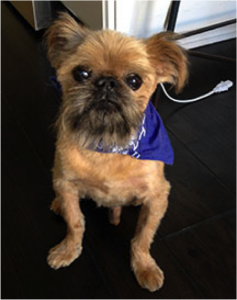Reports From Owners of SARDS Dogs That Now Have Vision
Posted on September 24th, 2014These owners were all told to go home and live with a blind dog. But because there is a treatment that is available for SARDS dogs, they were able to go home and live with a dog that can see.
LEXIE
If you were told there is no treatment for SARDS, please know there is a treatment. Just ask any of our family or friends who witnessed first-hand the transformation our dog has undergone over the past year. Lexie is now 8 years old and doing remarkable compared to a year ago at this time. We were asked to share Lexie's story so we'll start at the beginning.
Lexie is a Maltese who was born on 2/2/06 and had very few health problems early on. Some of her past medical history includes:
- Developing injection site reactions/granulomas after rabies vaccination in 2007 and again after her vaccination in 2010
- Biting and licking her paws incessantly during summer months from the ages of 4-7
- Excessive weight gain/excessive appetite starting around age 6
- Tore her ACL in January 2013, cruciate ligament repair surgery in February 2013
- Sudden vision loss July 2013
We had just moved to a new house in May of 2013 and we knew this would be a big adjustment for both our Maltese dogs. Things started out as expected with a few "accidents" in the house but nothing out of the ordinary as they were just getting acquainted with their new surroundings. About a month after the move we had several instances of coming home and finding Lexie in the basement, not being able to run back up the steps. We also noticed her occasionally bumping into furniture or struggling to go straight into the door of her kennel, sometime hitting the side of it. Her appetite had also increased significantly. Thinking nothing of this, we went on as normal until the day I was at home and watched Lexie walk right off a step and tumble down into the basement. Our stairs are right next to our bedroom door so I can only imagine she thought she was walking into the bedroom. This was enough, I called a local vet and made an appt. to have her vision looked at. Immediately, he referred us to Iowa State University Veterinary Medical Center.
We traveled to Ames, IA on July 18, 2013 and Lexie underwent a series of blood tests and examinations by ophthalmologists. The eye specialist did testing and concluded that she was "clinically blind." At the end of the day, Lexie's diagnosis was as follows: SARDS and suspected Cushing's Disease. We were told SARDS will lead to a non-reversible blindness and that blind dogs can live full and happy lives. They also gave us a list of helpful hints for managing visually impaired dogs. We went home and that night is when we googled SARDS and found Dr. Plechner. This changed Lexie's life.
We talked to Dr. Plechner who explained what SARDS really is, and how often SARDS dogs are diagnosed with Cushing’s. He explained how her symptoms were right on point with the cases he works with, and many of her symptoms were due to an imbalance of hormones. He even predicted correctly what her blood test results would show when we heard back from the lab in Texas. Immediately we needed to find a local vet who would follow Dr. Plechner's protocol and advice. It is very important to get started with steroid injections as soon as possible. We got lucky that we had just moved to a new town and found an amazing new veterinarian who was willing to give Lexie the injections she needed to get started. Not all vets would be willing to administer the initial injections required to get a dog’s levels under control, as most are unfamiliar with SARDS. Dr. Dirks at Dickinson County Animal Clinic in Spirit Lake, IA has been involved from the beginning and worked with Dr. Plechner to save Lexie's sight and more. A month or so after starting treatment we noticed a definite improvement in her eye sight and within 2 months it had returned most of the way. After her initial injections, her blood work leveled out and she started taking a dose of Depo-Medrol every morning and a thyroid pill twice each day. By January 2014, Lexie’s blood test came back that every one of her levels was back in the normal range.
It has been over a year now since Lexie started treatment, and she is as healthy as she's ever been. No longer licking her paws at all and going on long walks every day to get her weight down. Her vision is nearly perfect. She lies on the couch and barks at walkers and bikers going by on the road, runs up and down stairs without pausing, and navigates through any obstacle she approaches without bumping into anything. We are so thankful that we didn't take the advice of IA State and come home, do nothing, just let her go blind. Blindness wouldn't have been the only issue with the SARDS diagnosis, just the first in a long line of other effects and a steady downhill decline of her health. We truly believe that within a year, maybe two, we would have had to put her down at the rate she was going. Today, we can honestly say she should have many years ahead of her thanks to Dr. Plechner and his astonishing help!
TEDDY
 My 11 yr old male Brussels Griffon Teddy had always been a very healthy fit little dog who loved nothing more than going for long walks and being social with people and dogs. People often commented that he looked and acted like a puppy and were surprised to hear his age. At the end of January 2014, I suddenly noticed that Teddy who had never been a food obsessed dog had become insatiably hungry and was constantly looking for food even on our walks. After several days of this I made a vet appointment to have him checked. While we waited for the appointment over the next week on a couple of occasions I noticed a very subtle possibility of some diminished eye sight. It was almost undetectable if I wasn't so in tune with my dogs normal behavior but a couple times he would hesitate at curbs and once jumped too early that caused me to question if depth perception was a problem. I would have him track me or my hand though and all was fine. The day before our appointment it was becoming more apparent that something was going on with his vision and he was just starving. As we left for the vet the next morning Teddy could barely go down our front stairs and through the course of the day at our vet and then with Dr Hoffman at Pasadena Eye Care For Animals on that Feb. 7th, Teddy went completely blind in front of my eyes. The ophthalmologist said his ERG was flatlined and diagnosed him with SARDS. She said it was irreversible blindness and there was nothing I can do but gave me literature on how to adapt with a blind dog. It was 5pm and Teddy who still had some vision that morning was paralyzed with fear and completely unwilling to walk. His reaction was heartbreaking and life changing for both of us. We had a second opinion from a very trusted and reputable internist at ASEC but was told again that there was nothing We could do. Through fast research on the internet and a series of very stressful events I was led to Dr Al Plechner who seemed to be the only doctor studying SARDS and happened to be located in my city! I contacted him and he immediately called me right back. With SARDS there is a time pressure to correct the imbalances before the eye cells completely die. We met with him immediately and with many questions and more research I made the decision to try his protocol.
My 11 yr old male Brussels Griffon Teddy had always been a very healthy fit little dog who loved nothing more than going for long walks and being social with people and dogs. People often commented that he looked and acted like a puppy and were surprised to hear his age. At the end of January 2014, I suddenly noticed that Teddy who had never been a food obsessed dog had become insatiably hungry and was constantly looking for food even on our walks. After several days of this I made a vet appointment to have him checked. While we waited for the appointment over the next week on a couple of occasions I noticed a very subtle possibility of some diminished eye sight. It was almost undetectable if I wasn't so in tune with my dogs normal behavior but a couple times he would hesitate at curbs and once jumped too early that caused me to question if depth perception was a problem. I would have him track me or my hand though and all was fine. The day before our appointment it was becoming more apparent that something was going on with his vision and he was just starving. As we left for the vet the next morning Teddy could barely go down our front stairs and through the course of the day at our vet and then with Dr Hoffman at Pasadena Eye Care For Animals on that Feb. 7th, Teddy went completely blind in front of my eyes. The ophthalmologist said his ERG was flatlined and diagnosed him with SARDS. She said it was irreversible blindness and there was nothing I can do but gave me literature on how to adapt with a blind dog. It was 5pm and Teddy who still had some vision that morning was paralyzed with fear and completely unwilling to walk. His reaction was heartbreaking and life changing for both of us. We had a second opinion from a very trusted and reputable internist at ASEC but was told again that there was nothing We could do. Through fast research on the internet and a series of very stressful events I was led to Dr Al Plechner who seemed to be the only doctor studying SARDS and happened to be located in my city! I contacted him and he immediately called me right back. With SARDS there is a time pressure to correct the imbalances before the eye cells completely die. We met with him immediately and with many questions and more research I made the decision to try his protocol.
Teddy regained his vision after 6 weeks of being bat blind. First his far vision returned as I watched him track me at a distance undeniably. Then he started barking at dogs out the car window. I hadn't heard him bark since going blind and the dogs he was barking at were far and not barking. Soon after his near vision returned and as far as I could tell he had full vision recovery. Teddy now is practically normal. Nobody would ever know he had any vision impairment even. He has his near and far vision back. His whole personality is back. He runs up and down stairs. Follows hand signal commands with no words for sit, down, stay and shake. The whole neighborhood that witnessed the frightened hesitant barely functional dog that Teddy had become constantly stops me to ask how this can be! Nobody can believe the miracle. Teddy has regained his whole quality of life back, his happiness, confidence and ability to enjoy all the things he loves the most. We continue the maintenance dose of Dr Plechner’s protocol and his blood work continues to improve. We have showed Teddy to all the vets at ASEC who are amazed but we have not yet returned to the ophthalmologist. We are happy to have Teddy meet anyone who is wanting to witness the return of his vision. I have photographs and I think some video of Teddy just stuck staring in corners and unable to function while being blind.
Dr Plechner has stood by us every step of the way. He has selflessly dedicated his time and knowledge to do whatever he could to help Teddy get well and regain his vision. We will forever be grateful for all his amazing research, hard work and dedication to his patients.
AUDREY AND OLIVER
BACKGROUND
 At the end of April 2014 I noticed a sudden change in my dog Audrey's eyesight. Audrey, my 5 year old Yorkie mix, who was always quick to grab a treat, simply could not see it. I immediately took her to see an ophthalmologist at Eye Care for Animals in Pasadena, CA. Tests on Audrey revealed a flatline ERG, and Audrey was diagnosed with SARDS. The ophthalmologist said there was a very slight chance that Audrey's eyesight loss could be helped by 30 day course of steroids and antibiotics, but because Audrey's liver values were abnormally high, she could not put Audrey on steroids. Hence, she gave me literature on living with a blind dog and said there was nothing she could do. I was absolutely devastated.
At the end of April 2014 I noticed a sudden change in my dog Audrey's eyesight. Audrey, my 5 year old Yorkie mix, who was always quick to grab a treat, simply could not see it. I immediately took her to see an ophthalmologist at Eye Care for Animals in Pasadena, CA. Tests on Audrey revealed a flatline ERG, and Audrey was diagnosed with SARDS. The ophthalmologist said there was a very slight chance that Audrey's eyesight loss could be helped by 30 day course of steroids and antibiotics, but because Audrey's liver values were abnormally high, she could not put Audrey on steroids. Hence, she gave me literature on living with a blind dog and said there was nothing she could do. I was absolutely devastated.
TREATMENT DECISION
Through research on the Internet, we found stories and blogs from people who had reversed and cured their dogs' SARDS eyesight loss via a protocol developed by a veterinarian in the Los Angeles, CA area, Dr. Al Plechner. I contacted Dr. Plechner, who in turn spoke with my local vet and she and I began his protocol. I did not make the decision to follow his protocol haphazardly. I had a long phone conversation with someone who wrote a blog about the experiences of her dog and how her dog regained her eyesight through Dr. Plechner's protocol. I took Dr. Plechner's protocol to a human endocrinologist and asked for feedback, asking if the science seemed plausible. Although he stressed he was not a veterinarian, the endocrinologist thought Dr. Plechner's protocol might work. And, I made the two hour drive down to Los Angeles to meet Dr. Plechner so I could make my own instinctive judgement about this man and his work. What I found was a man who is deeply and genuinely passionate about saving the eyesight, and perhaps even ultimately the life, of SARDS patients. This is most definitely a man who is not in it for any type of monetary gain; he genuinely wants to cure dogs, and has worked tirelessly to do so...his passion for this is unmistakeable. He was most definitely born to be a veterinarian.
RESULTS - BEFORE & AFTER
Before Audrey's eyesight loss, she had begun losing a lot of hair. She was my little fluffy pooch no longer, and we couldn't figure out why. She had also developed allergies. My other dog, Oliver (who is genetically a relative of Audrey's), was also starting to lose hair, but not to the degree that Audrey was. We tested Oliver and discovered that he had the same hormone imbalance as Audrey (high estrogen), yet it had not progressed as far as Audrey's had. With both of my dogs on Dr. Plechner's protocol, I have seen amazing results. Audrey's distance vision has returned, and she's no longer bumping into things. I just moved to a new home last week and she is getting around in unfamiliar surroundings just fine. Recent blood tests reveal that her estrogen is almost suppressed, so I am anticipating the return of her near vision soon. Audrey's former high liver values are lowering and returning to normal, and her allergies are gone. Oliver, who had abnormally high kidney values before starting this protocol, now has completely normal kidney values. Both dogs now have normal hair growth and everyone who has not seen them for a little while comments on how great their coats look--what a big difference!
NEXT STEPS
Once Audrey's near vision returns, I plan to travel back to Pasadena so that the ophthalmologist at Eye Care for Animals can see firsthand Audrey’s amazing recovery. It is my hope that my testimony to her and others will ultimately help dogs who experience this terrible condition.
Jane Brown
Santa Barbara, CA

